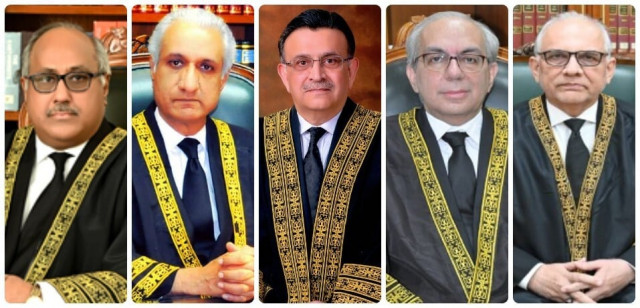CJ-led bench suspends govt notification
Top court notes govt didn’t consult with CJP before forming body to verify veracity of audio leaks involving judges

As expected, the Supreme Court on Friday stayed the proceedings of an inquiry commission led by Justice Qazi Faez Isa, probing the veracity of recent audio leaks and their impact on independence of the judiciary.
“Prima facie, the very constitution of the commission is cast in doubt as the government did not consult the chief justice of Pakistan for the nomination of a judge,” read an eight-page order authored by CJ Umar Ata Bandial.
A five-judge SC bench, which apart from the chief justice, included Justice Ijazul Ahsan, Justice Munib Akhtar, Justice Syed Hasan Azhar Rizvi and Justice Shahid Waheed, issued the order while hearing four petitions filed by PTI Chairman Imran Khan, Supreme Court Bar Association (SCBA) President Abid Zuberi as well as others against the inquiry commission formed by the federal government last week
The commission also included Balochistan High Court Chief Justice Naeem Akhtar Afghan and Islamabad High Court Chief Justice Aamer Farooq.
“In the circumstances, till the next date of hearing, the operation of the impugned notification No.SRO.596(I)/2023 dated 19.05.2023 issued by the federal government is suspended as is the order dated 22.05.2023 made by the commission and in consequence thereof [the] proceedings of the commission are stayed,” the order read.
The court has issued the notices to the respondents in all the petitions. “[A] notice be also issued to the learned Attorney General for Pakistan [AGP] in terms of Order XXVIIA of the Civil Procedure Code,” the order added.
During the hearing, AGP Mansoor Awan sought permission to make a preliminary submission, saying that CJP Bandial ought to consider recusing himself from the bench on account of a certain conflict of interest.
The order, however, maintained that it was an accepted and settled constitutional principle, acted upon several times in the constitution of commissions, that whenever a sitting judge was intended to be made a member of the body, the permission of the chief justice of Pakistan had to be sought first.
Read: Judges kick off ‘open’ probe into audio leaks
“Since this power was peculiar to the said office, the incumbent for the time being of the same could neither divest himself nor be divested by the federal government from discharging the constitutional duty,” the order stated.
The order further noted that as the federal government appeared to have acted unilaterally in this matter, a “constitutional principle” of the highest importance had been, prima facie, "breached".
“We may note in this regard that even though the other two members of the commission are chief justices of respective high courts as noted above, the subject matter of the reference transcends any particular high court and involves at the very least a sitting judge of the Supreme Court and a chief justice of a third high court. Therefore, keeping in mind the settled principles of federalism, prima facie, the aforementioned constitutional principle would apply even in regard to the other two members of the commission and therefore, the permission of the Hon’ble Chief Justice of Pakistan was required for their appointment,” the order read.
The order noted that therefore, prima facie, the very constitution of the commission was cast in doubt.
During the hearing, CJP Bandial regretted that deliberately or unknowingly, efforts were under way to create a wedge between two sections of the SC judges.
He also remarked that the May 9 violence had benefitted the judiciary as statements against it had stopped.
He also raised questions on the constitution of the inquiry commission, maintaining that it violated the trichotomy of powers and encroached upon Article 209 of the Constitution.

1724319076-0/Untitled-design-(5)1724319076-0-208x130.webp)

















COMMENTS
Comments are moderated and generally will be posted if they are on-topic and not abusive.
For more information, please see our Comments FAQ